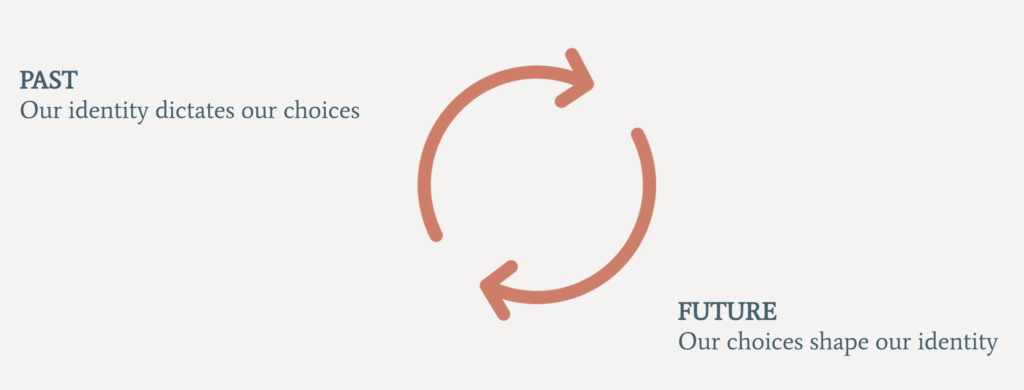Would you want to watch the same play with the same actors repeating the same lines over and over again, with just some small variations in their tone each time? You’d probably get bored pretty quickly. And yet, that’s what we often unconsciously do when making career and life decisions.
If you ever applied for a job, you probably did the little retrospective dance of editing your resume so it followed a consistent narrative. When you get a job interview, you may get asked: “Where do you see yourself in five years?” and you’re supposed to have a coherent vision that’s aligned with your current self.
This is the self-consistency fallacy at play: the misguided assumption that “I have always acted in a certain way; therefore, I must continue to act in this way.” It’s an invisible yet powerful force that affects our path whenever we find ourselves at a crossroads.

When our past dictates our path
While it’s undeniable that our past influences our future, we tend to place more rigid limits on ourselves than actually exist. This phenomenon is so widespread that it has many names. Psychologists refer to it as the “continuation bias”, economists talk of “path dependence”, and philosophers might frame it as a battle against determinism. I call it the self-consistency fallacy.
The self-consistency fallacy is why you may choose a new job based on your past roles and why you may stay within your field of study even when your interests have evolved. It’s also why we maintain the same roles and behaviors in our relationships, such as always being the “quiet one” in our circle of friends even when we feel a desire to express ourselves more openly.
The same goes for our health choices. You may stick to your running routine and miss out on the potential benefits of other activities like swimming, yoga, or weight training. Or you may hold onto dietary habits because it’s “what I’ve always done”—such as a meat-eater automatically disregarding plant-based diets.

Some of these may seem unimportant, but when you add up all of the ways the self-consistency fallacy affects your decisions, it all adds up to the equivalent of a monorail guiding the overall direction of your life. Fortunately, we don’t have to stay slaves to these mental shackles.
Breaking free of the self-consistency fallacy
We can’t deny that our previous choices and current beliefs form an important part of our identity, but they should not become an artificial boundary that guides our choices.
As John Maynard Keynes puts it: “The difficulty lies, not in the new ideas, but in escaping the old ones, which ramify, for those brought up as most of us have been, into every corner of our minds.” You are a dynamic being capable of change and growth. You are a verb, not a noun. When exploring potential paths forward, you can ask yourself the following questions to let go of preconceived expectations and allow yourself to expand your horizons beyond who you have been so far:
- Are there opportunities that I have dismissed because they don’t fit my existing trajectory?
- What new paths might I be able to explore if I were not bound by my past choices?
- What would my ideal career look like if I could start from a blank slate?
The role of these questions is not to make you abandon your current path. Rather, it’s to make you more open to opportunities that are not obviously aligned with your present priorities: the “weird” projects that pique your curiosity, the fun ideas that present no clear professional benefits, the collaboration with a long-time friend that has nothing to do with your career.
We don’t know what we don’t know, so it is often from those tangents that arise the best opportunities for learning and growth. The stories we will share in the future may be squiggly, and strange, but at least they won’t be boring.
